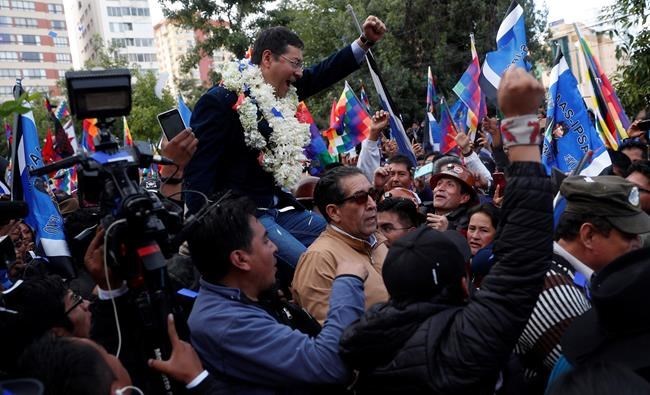
Luis Arce, presidential candidate for the Movement Towards Socialism party, MAS, party, is carried by his supporters before registering his candidacy at the Supreme Electoral Tribunal in La Paz, Bolivia, Monday, Feb. 3, 2020. Arce was named by exiled President Evo Morales as his party's candidate for May 3 presidential elections. (AP Photo/Juan Karita)
Republished February 04, 2020 - 10:17 AM
Original Publication Date February 04, 2020 - 9:31 AM
LA PAZ, Bolivia - The party of ousted President Evo Morales faced a fractured opposition as Bolivia began campaigns Tuesday for May 3 elections to replace the leftist leader, but early polls indicate it may not have enough support to win outright and avoid a runoff.
Eight parties registered for the upcoming special general election by the midnight Monday deadline, most of them hoping to capitalize on the protest movement that forced the nation's first indigenous president to resign in November. That followed massive demonstrations over alleged vote-rigging in last year's balloting.
The Electoral Tribunal still must certify whether the candidates meet requirements — with the big question being whether Morales. barred by law from seeking the presidency, will be allowed to run for Senate.
Candidates are supposed to be residents of Bolivia, but Morales is living in exile in Argentina and facing charges connected to last October's allegedly fraudulent election, which he claimed had reelected him to a fourth term in office.
The country remains bitterly divided following the often-violent tumult that erupted before and after Morales was pushed to resign. Jean Arnault, envoy of the U.N. secretary-general, warned against “exacerbated polarization” and called on all sides to work for an election “without abuses, intimidation or discrimination.”
Morales's Movement Toward Socialism party, which currently holds a majority in congress, is strongest among indigenous, rural and working class urban regions. But in an apparent move to broaden its appeal, it nominated a London-educated technocrat, Luis Arce, as its presidential candidate.
“Morales is reaching out to the middle class from which he had grown apart," said analyst Carlos Borth, a former congressman. “That explains having picked Arce and not an indigenous person.”
The middle classes and conservative sectors played a central role in the protests that led police and military leaders to urge Morales to resign after 14 years in power, during which he was accused of increasingly authoritarian behaviour.
The other contenders include centrist former President Carlos Mesa, who finished second in the October vote, though many of his former supporters have shifted to more conservative candidates.
Those include interim President Jeanine Áñez, whose government has worked to overturn many of Morales' policies and prosecute his allies, as well as regional civic leader Luis Fernando Camacho, a major leader of protests in the eastern economic centre of Santa Cruz.
Both have appealed to a growing conservative religious bloc of votes, as has Korean-born evangelical pastor and physician Chi Hyung Chung, who is running again after receiving about 9 per cent of the vote in October.
Áñez had been a second-tier political figure as a senator before the resignation of several Morales allies who outranked her put her in line to claim the presidency.
A mid-January poll by the Mercados y Encuestas consulting firm showed Arce supported by 26%, Mesa and Camacho with 17% and Áñez with 12%. The poll, which reported a margin of error of about 3.5 percentage points, was carried out before Áñez confirmed she was running.
A second round would be held unless one candidate wins either an outright majority or has 40% of the vote and a 10 percentage point lead over the next highest finisher.
Morales has presented a complaint before the Interamerican Human Rights Commission alleging that police, in arresting his former secretary, had seized documents he needs to register as a candidate.
The secretary, Patricia Hermosa, was detained last week on the same charges of charges of sedition and terrorism that face Morales — based on allegations they helped stir up protests to block food deliveries following his ouster.
.
News from © The Associated Press, 2020